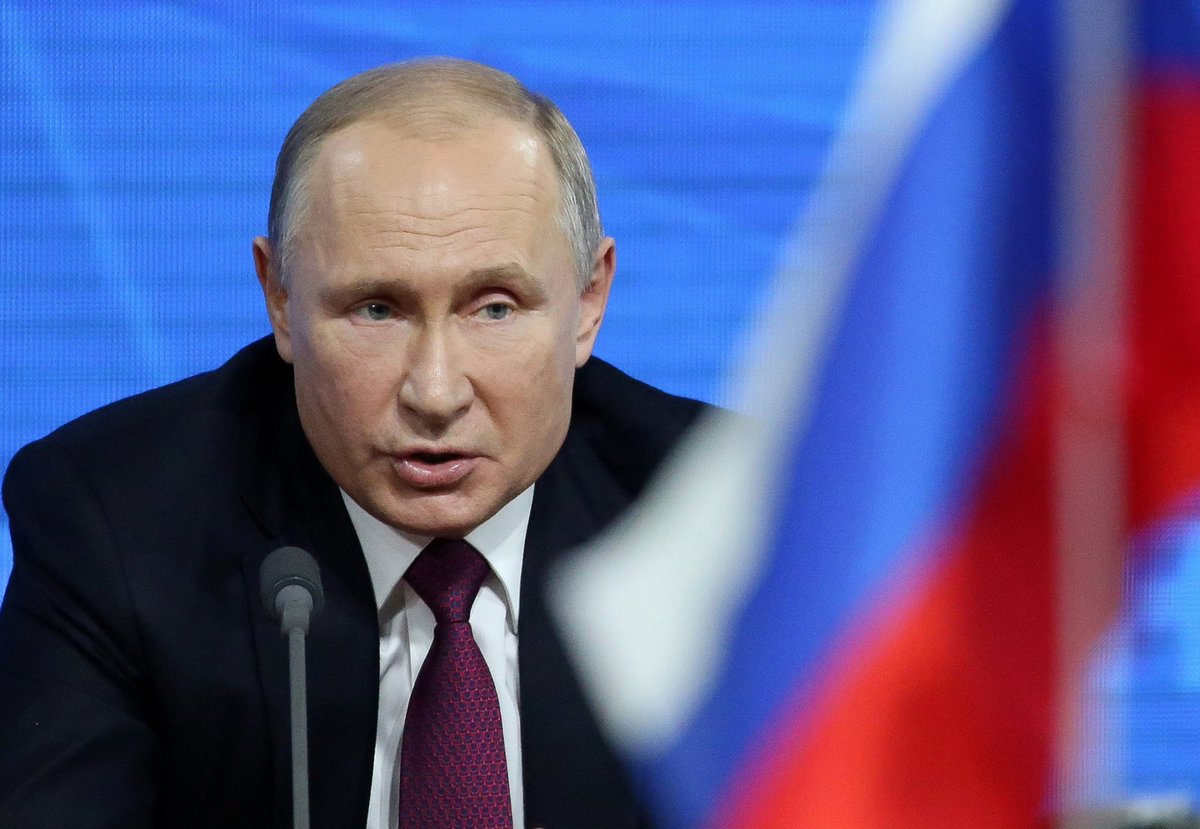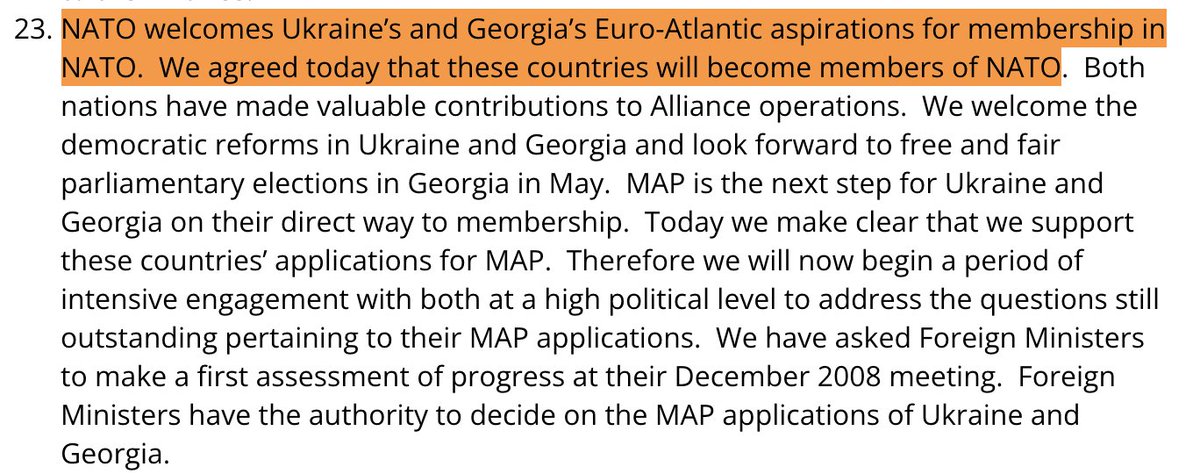
URGENT: I have a proposal to stop the war over Ukraine.
It's a diplomatic solution.
It doesn't give the West or Russia everything they want – but it overcomes each side's primary objections. 🧵
It's a diplomatic solution.
It doesn't give the West or Russia everything they want – but it overcomes each side's primary objections. 🧵

Russia has demanded formal legal guarantees that Ukraine will never join NATO.
It has released a public draft of a proposed treaty including that and other, bigger concessions from the West.
It says all those terms are negotiable – but that Ukraine in NATO is a red line.
It has released a public draft of a proposed treaty including that and other, bigger concessions from the West.
It says all those terms are negotiable – but that Ukraine in NATO is a red line.

The U.S. has informally assured Russia that there is no imminent plan for Ukraine to join NATO.
However, it refuses to provide the formal legal guarantee that Russia is demanding.
It claims that excluding Ukraine from NATO would be unlawful.
However, it refuses to provide the formal legal guarantee that Russia is demanding.
It claims that excluding Ukraine from NATO would be unlawful.

Why would excluding Ukraine from NATO be unlawful?
Because of other international agreements.
We have to briefly review what they say, in order to figure out what can be done legally to avert war.
Because of other international agreements.
We have to briefly review what they say, in order to figure out what can be done legally to avert war.
First, the North Atlantic Treaty (1949), NATO's founding document, sets forth an open-door policy.
It says "any other European state" can be added by unanimous agreement.
However, the states have to further the principles of the Treaty and contribute to regional security.
It says "any other European state" can be added by unanimous agreement.
However, the states have to further the principles of the Treaty and contribute to regional security.

This policy was bolstered by OSCE agreements signed by the U.S., its European Allies, and the Soviet Union.
The Helsinki Final Act (1975) gives sovereign states "the right to be or not to be a party to treaties of alliance."
The Helsinki Final Act (1975) gives sovereign states "the right to be or not to be a party to treaties of alliance."

The Charter of Paris (1990) recognizes "the freedom of States to choose their own security arrangements." 

This principle was reaffirmed by the OSCE states, including Russia, in the Istanbul Document (1999).
It forbids "spheres of influence." But it also says states must not "strengthen their security at the expense of the security of other States."
It forbids "spheres of influence." But it also says states must not "strengthen their security at the expense of the security of other States."

There is obviously tension between these agreements and Russia's proposed treaty with the U.S.
The same problem exists in its proposed agreement with NATO.
Both documents expressly restrict future membership in the alliance, contrary to the principle of state sovereignty.
The same problem exists in its proposed agreement with NATO.
Both documents expressly restrict future membership in the alliance, contrary to the principle of state sovereignty.

However, Russia's underlying demand is not inconsistent with international law.
It contends that its security is threatened by expansion of a hostile military bloc to its border.
In particular, President Putin has emphasized the danger to Moscow from NATO missiles in Ukraine.
It contends that its security is threatened by expansion of a hostile military bloc to its border.
In particular, President Putin has emphasized the danger to Moscow from NATO missiles in Ukraine.

Is there a way to address Russia's core security interests without violating international law?
Yes. It starts with NATO's Bucharest Summit Declaration. (2008)
That document is the source of Russia's security dilemma – so it should be partially withdrawn.
Yes. It starts with NATO's Bucharest Summit Declaration. (2008)
That document is the source of Russia's security dilemma – so it should be partially withdrawn.

The offending portion is Section 23, which states that Ukraine "will become" a member of NATO.
This language makes NATO officially committed to a course of action that Russia considers an existential threat to its security.
This language makes NATO officially committed to a course of action that Russia considers an existential threat to its security.

The language is not a core part of the alliance. It was forced into the declaration by the Bush administration.
At the time, Ukraine wanted a "Membership Action Plan" – the final step before becoming a NATO member.
In Bucharest, France and Germany said "No."
At the time, Ukraine wanted a "Membership Action Plan" – the final step before becoming a NATO member.
In Bucharest, France and Germany said "No."
As a "consolation prize" for Ukraine, the Bush administration secured the language in Section 23.
That's a critical fact to remember.
It means that the Section 23 commitment is *less than* a Membership Action Plan – which has never been offered to Ukraine.
That's a critical fact to remember.
It means that the Section 23 commitment is *less than* a Membership Action Plan – which has never been offered to Ukraine.
Even under MAP, states are not automatically admitted to NATO.
They have to show progress on identified criteria – like eliminating corruption, or resolving conflicts with neighbors.
Their application is reviewed under those criteria every year.
They have to show progress on identified criteria – like eliminating corruption, or resolving conflicts with neighbors.
Their application is reviewed under those criteria every year.
Logically, for the MAP process to work, it has to be possible for states that do a bad job to fail.
NATO has made that clear.
In its words, participation in a MAP "does not prejudge any decision in the Alliance on future membership."
NATO has made that clear.
In its words, participation in a MAP "does not prejudge any decision in the Alliance on future membership."

The same principle logically applies to Ukraine.
Since it does not even have a MAP from NATO, its future membership in NATO cannot be guaranteed.
Section 23 of the Bucharest Declaration does not exclude the possibility that Ukraine will simply fail to improve enough.
Since it does not even have a MAP from NATO, its future membership in NATO cannot be guaranteed.
Section 23 of the Bucharest Declaration does not exclude the possibility that Ukraine will simply fail to improve enough.
In particular, Ukraine continues to have a severe problem with corruption.
Transparency International ranks it 117th in the world – the lowest score of any country in Europe, excluding Russia.
Transparency International ranks it 117th in the world – the lowest score of any country in Europe, excluding Russia.

Based on this problem with corruption, Ukraine's status under Section 23 of the Bucharest Summit Declaration should be withdrawn.
Russia's policy does not even need to be taken into account.
This can be done as a "housekeeping" matter within NATO.
Russia's policy does not even need to be taken into account.
This can be done as a "housekeeping" matter within NATO.
The voices for a pivot away from the Bucharest Summit Declaration are already sounding within the alliance.
Today, the President of Croatia said, "Ukraine has no place in NATO. It is one of the most corrupt countries in the world."
Today, the President of Croatia said, "Ukraine has no place in NATO. It is one of the most corrupt countries in the world."

Rescinding Section 23 of the Bucharest Summit Declaration as to Ukraine would formalize this sentiment.
It would eliminate the core "red line" that Russia has used to justify its aggressive strategic posture.
And it would accomplish that without violating international law.
It would eliminate the core "red line" that Russia has used to justify its aggressive strategic posture.
And it would accomplish that without violating international law.
Ukraine would also receive what it has been asking for.
President Zelensky has said: “If we are talking about NATO and MAP, I would really like to get specifics — yes or no.”
NATO would finally be saying, "No." An honest answer is better than an endless fiction.
President Zelensky has said: “If we are talking about NATO and MAP, I would really like to get specifics — yes or no.”
NATO would finally be saying, "No." An honest answer is better than an endless fiction.

Many will argue that, even if NATO makes this concession, Russia could still invade Ukraine.
My answer? If so, removing the issue of Ukraine in NATO is still strategic.
It eliminates that issue as a rationale for Russia's behavior, forcing Russia's true motives into the open.
My answer? If so, removing the issue of Ukraine in NATO is still strategic.
It eliminates that issue as a rationale for Russia's behavior, forcing Russia's true motives into the open.
I'd also like to ask those people: What if you're wrong?
What if we could really stop a war that will kill thousands of people?
... And all we had to do was tell the truth to the people of Ukraine about NATO's plan for their country?
What if we could really stop a war that will kill thousands of people?
... And all we had to do was tell the truth to the people of Ukraine about NATO's plan for their country?

Some have argued that corruption is not a legitimate basis for rejecting Ukraine from NATO.
They claim that several of today's NATO members were arguably just as corrupt as Ukraine when they joined NATO.
This line of reasoning is flawed.
They claim that several of today's NATO members were arguably just as corrupt as Ukraine when they joined NATO.
This line of reasoning is flawed.
The axiom that states joining NATO must advance the alliance's principles – including the rule of law – is enshrined in the North Atlantic Treaty itself.
The importance of the rule of law was at the top of the list of criteria adopted in the Study on NATO Enlargement (1995).
The importance of the rule of law was at the top of the list of criteria adopted in the Study on NATO Enlargement (1995).

If this criterion was not faithfully followed during past waves of NATO expansion, then that casts doubt on their legitimacy.
However, it does not *abrogate* the importance of the rule of law and anti-corruption in aspiring members of NATO.
However, it does not *abrogate* the importance of the rule of law and anti-corruption in aspiring members of NATO.
Corrupt states should not have a free pass to become NATO members, simply because admission standards have sometimes been applied loosely.
Enforcing the anti-corruption requirement on Ukraine will not be unfair.
It will be a straightforward application of NATO rules.
Enforcing the anti-corruption requirement on Ukraine will not be unfair.
It will be a straightforward application of NATO rules.
• • •
Missing some Tweet in this thread? You can try to
force a refresh










